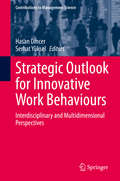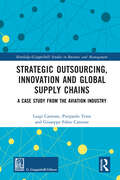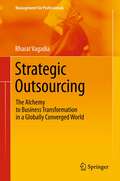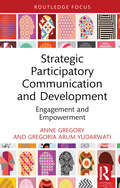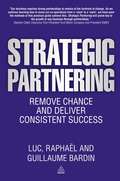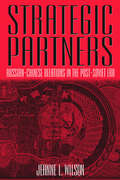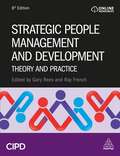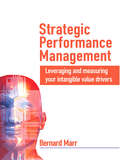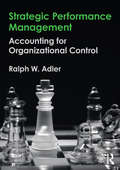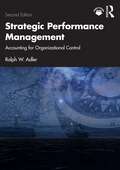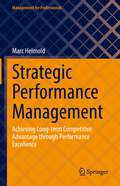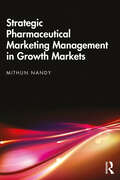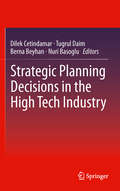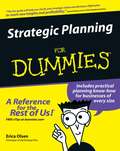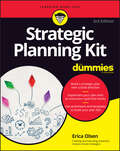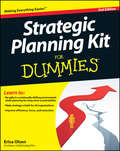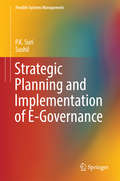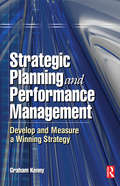- Table View
- List View
Strategic Outlook for Innovative Work Behaviours: Interdisciplinary and Multidimensional Perspectives (Contributions to Management Science)
by Hasan Dincer Serhat YükselThis book presents various perspectives on innovative work behaviour, focusing on problem recognition, idea generation, idea promotion and the realisation of these ideas. It first highlights important corporate issues, such as uncertainty, performance management, technological infrastructure, and strategy development, and subsequently presents studies that offer solutions. Further, the book evaluates the significance of research and development, effective communication and corporate governance. Lastly, it discusses the implications of idea realisation, examining resource dependence theory, organizational trust and eco-innovations.
Strategic Outsourcing at Bharti Airtel Ltd.
by V. G. Narayanan F. Asis Martinez-Jerez Michele JurgensFaced with exponential growth and a competitive telecom environment, Bharti looks for ways to better manage its capital expenditures for telecommunications and information technology. One option is to hand over management of its telecom and IT networks to its vendors. Explores the pros and cons of such an outsourcing arrangement for a company in an industry where technological superiority is considered an essential element in competitive strategy.
Strategic Outsourcing at Bharti Airtel Ltd. One Year Later
by V. G. Narayanan F. Asis Martinez-Jerez Michele JurgensAn abstract is not available for this product.
Strategic Outsourcing, Innovation and Global Supply Chains: A Case Study from the Aviation Industry (Routledge-Giappichelli Studies in Business and Management)
by Luigi Cantone Pierpaolo Testa Giuseppe Fabio CantoneDecision-making on outsourcing new product development (especially innovation projects), such as engaging and managing the supply chain, is far from easy. It may involve addressing strategic and operational risks that might cause longer development times and increase innovations costs. It is, therefore, imperative to select suppliers very carefully and set up an effective management strategy vis-à-vis the supply partners right from the inception phase. Supply chain management is facing enormous challenges, driven by interrelated disruptions that will have a vast and lasting impact. Based on a relevant case study, Boeing 787 Dreamliner programme, this volume offers a comprehensive overview of the decision-making models for outsourcing strategic activities. The proposed model suggests a valuable approach to outsourcing the decision-making strategies for new product development when the innovation is driven by technological innovation.
Strategic Outsourcing: The Alchemy to Business Transformation in a Globally Converged World
by Bharat VagadiaThis book provides a road-map to successful implementation of strategic outsourcing programmes, providing down-to-earth approaches to outsourcing decision making and programme management, based on a grass-roots understanding. A practitioner-focused book for business leaders and managers providing a holistic view of strategic outsourcing, covering the three essential pillars of success: risks, rewards and relationships. The author shows how business leaders can transform organisational business models, structures and mind-sets, taking the reader on a journey through the book's fifteen chapters, helping the reader truly grasp: the drivers for change as a result of globalisation and convergence and their impact on organisational strategies; how outsourcing can transform the various processes and functions of an organisation; the impact outsourcing is having on various industry vertical sectors; the eight foundations of successful strategic outsourcing programmes, which when combined with strategic decision-making knowledge, guarantees that organisations embarking on the strategic outsourcing journey, derive the transformational benefits they seek.
Strategic Participatory Communication and Development: Engagement and Empowerment
by Anne Gregory Gregoria Arum YudarwatiThere has been a recent shift in the nature of public engagement from a culture of paternalism and control towards a public-centred approach involving collaboration and co-creation. This book draws on public relations and development communication insights to build a new community engagement model for public sector organisations who wish to engage with rural communities in developing countries. This theoretical model also offers a practical framework for Government in particular to engage with and empower rural communities as they adopt and exploit infrastructure developments. The outcome is mutual benefit.By examining in detail how Government communicates with rural communities on renewable energy infrastructure projects in Indonesia, and underpinned by empirical research with those communities, this new participatory framework has been developed. It envisages progressive empowerment of rural communities as Government encourages active engagement on the installation and exploitation of renewable energy. This entails encouraging communities to determine for themselves their uses of sustainable energy sources and to take ownership of a co-determined future. In so doing, the Government itself is more likely to achieve its own renewable energy commitments.Research-based and combining theory with practice, this thought-provoking book will be welcomed by strategic communication and public relations scholars and practitioners alike.
Strategic Partnering
by Guillaume Bardin Raphaël Bardin Luc BardinStrategic Partnering - remove chance and deliver consistent success - is designed to take the guesswork out and provide you with a ground-breaking and fully encompassing system of rules and processes, to make your partnering strategy a vitally important and transformational reality. Supported by invaluable insights from a wealth of senior leaders across a range of leading global organizations, the book introduces a comprehensive and practical new model of demonstrated methodologies, to remove chance from the partnering process and help you target 100 per cent success. Whether you are a government official, board member, CEO, senior executive, account or procurement leader, marketer or a manager involved in value added relationships within your organization, then this book could be the 'vade mecum' to the development of your successful strategic partnering strategy and prove deeply 'transformational' to the way you think about, run and create value in your organization or business.
Strategic Partners: Russian-Chinese Relations in the Post-Soviet Era
by Jeanne WilsonRussia's foreign policy experience in the first post-Soviet decade was marked by disappointments as well as surprising turns. Expectations that Russia would join the Western powers as an equal partner were frustrated, while relations with the People's Republic of China warmed considerably. Today, Russia's relationship with China is an important component of its overall foreign policy orientation, as the two states - one greatly diminished, the other clearly on the rise - have found themselves sharing an interest in curbing the power of the United States. In analyzing Russia's evolving foreign policy vis-a-vis China, the author takes into account the legacy of Soviet-era precedents; the simultaneous processes of economic policy change and integration into global economic structures; and military relations. By shedding light on the role of political realism, decision makers, and exogenous factors in Russian foreign policy, this analysis of an important bilateral relationship contributes to the larger project of understanding international relations and the dynamics of domestic and foreign policy change.
Strategic People Management and Development: Theory and Practice
by Gary Rees and Ray FrenchStrategic People Management and Development maps to the CIPD Level 7 module 'People Management and Development strategies for performance'. It focuses on the need for evidence-based and outcome-driven practice in the people profession and explains how HR and Learning and Development (L&D) professionals can create value and drive performance in an organisation. It provides a thorough grounding in the theory and practice of how to lead and manage employees and effectively develop a workforce as well as extensive coverage of how to ensure professionalism and ethical behaviour in the people function. This book also includes discussion of organisation development and how high-performance work practices drive positive organisational and employee outcomes. This book also includes practical advice on key HR activities including recruitment, job design,and reward. Fully updated throughout, this book includes case studies to help students see how the theory applies in practice, reflective practice activities to help them think critically about the content and self-test their learning progress as well as 'explore further' boxes to encourage wider reading. Online resources include an instructor's manual, lecture slides, and sample essay questions.
Strategic Performance Management
by Bernard Marr Dina GrayThis book is about strategic performance management for the Twenty-First Century organization. In a practical step-by-step approach it navigates readers though the identification, measurement, and management of the strategic value drivers as enables of superior performance. Using many real life case examples this book outlines how organizations can visualize their value creation, design relevant and meaningful performance indicators to assess performance, and then use them to extract real management insights and improve everyday strategic decision making as well as organizational learning. A key focus of the book is the important issue of creating value from intangible assets. Much has been written about the importance of intangible assets such as knowledge, skills, relationships, culture, practices, routines, and intellectual property as levers for organisational success. However, little has been published that tells managers how to do that. This book moves beyond just raising awareness and provides practical tools and templates, gathered in many extensive case studies with world-leading organizations. The key issues the book addresses are: • How do we identify the strategic value drives, especially the intangibles, in our organisations? • How do we understand their strategic value using the powerful mapping tools?• How do we then measure the business performance? • How do we use performance indicators to improve decision making and organisational learning? • How do we align performance reviews and risk management with our strategy?Well grounded in theory and packed with case studies from around the world, this book will function as a guide for managers as well as a reference work for students and researchers. The tools described in this book are not only suitable for leading international corporations, but have been designed to be equally appropriate for not-for-profit organizations, central and local government institutions, small and medium sized businesses, and even departments and business units. The ideas, tools, and templates provided allow managers to apply them straight away and transform the way they manage strategic performance at all levels of their organization.
Strategic Performance Management: Accounting for Organizational Control
by Ralph W. AdlerOne of the most important challenges that people in senior management positions face is the responsibility of ensuring their organizations’ effective practice of performance management. As this book reveals, performance management comprises an interdisciplinary field of study and practice that draws upon a wide set of business disciplines, including strategic management, organizational behaviour, organizational theory, and management accounting. This book provides a contemporary examination of theories, issues, and practices related to performance management. An original performance management framework helps structure the book, and in particular the ordering and layout of the book’s chapters. Unlike other performance management frameworks, the one used here is grounded in concrete organizational phenomena, therefore making it more accessible and meaningful to practitioners, scholars, and students.
Strategic Performance Management: Accounting for Organizational Control
by Ralph W. AdlerEffective performance management is core to successful organizations. The new edition continues to look at performance management as an interdisciplinary field of study and practice and draws upon a wide set of business disciplines, including strategic management, organizational behaviour, organizational theory, and management accounting. The book provides a contemporary examination of theories, issues, and practices related to performance management with an original performance management framework, grounded in concrete organizational phenomena, therefore making it more accessible and meaningful to practitioners, scholars, and students. The updated edition also examines organizations’ evolving use of digital business transformation and the effect on performance management design. With updated cases, the latest edition will help readers to gain insights into the fields of strategic management, organizational behaviour, organizational theory, and management accounting and how they contribute to the study and practice of performance management.
Strategic Performance Management: Achieving Long-term Competitive Advantage through Performance Excellence (Management for Professionals)
by Marc HelmoldFierce competition in many industries, megatrends, the COVID-19 pandemic, the ongoing globalisation and the permanent liberalisation of markets have changed the face of economies and businesses drastically. Companies must establish suitable and long-term strategies and performance criteria in order to survive in this dynamic and hostile environment. This book provides a holistic and practical approach to strategic performance management. It combines all functions of the value chain and contains best practices in performance. The author demonstrates how new paradigms enable companies to concentrate on value-adding activities and processes to achieve a long-term sustainable and competitive advantage. The book contains a variety of best practices, industry examples and case studies. Focusing on best-in-class examples, the book offers the ideal guide for any enterprise to achieve a competitive advantage across all business functions focusing on value-adding activities.
Strategic Perspective on Bankruptcy
by Andrew N. Mclean William W. George James M. SharpeProvides an overview of bankruptcy procedures in U.S. courts and a framework for evaluating the different sources of uncertainty and their implications for various stakeholders of the firm when attempting a reorganization with creditors or considering opening a court-supervised reorganization under Chapter 11 of the Bankruptcy Code. Recent data on filings is presented as well as a summary of the hierarchy of claims and outline of bankruptcy events. While the stigma associated with bankruptcy for executives and boards of directors has diminished, companies can use the threat of a voluntary bankruptcy as a bargaining tool to negotiate with creditors.
Strategic Pharmaceutical Marketing Management in Growth Markets
by Mithun NandyIndia is the largest provider of generic drugs globally. The Indian pharmaceutical sector supplies over 50% of the global demand for various vaccines and, as a result, holds an important position in the global pharmaceutical sector. This book is a comprehensive study of pharmaceutical marketing management in the Indian context and similar growth markets. The book introduces the fast-paced and multi-faceted discipline of pharmaceutical marketing management through an in-depth discussion on the genesis and evolution of its marketing concept. Combining theory and practice, it offers a strategic approach to pharmaceutical marketing from an organizational and business perspective and explicates the practical applications of it. Richly supported by case studies, the book brings together fresh perspectives and approaches equally useful for students and professionals. This book will be of interest to academicians, advanced students, and practitioners of pharmaceutical marketing and pharmaceutical management. It will also be beneficial to those interested in business strategy, decision-making, and international marketing.
Strategic Planning Decisions in the High Tech Industry
by Berna Beyhan Dilek Cetindamar Tugrul Daim Nuri BasogluThe scale and complexity of research and practices of open innovation mandate a correspondingly sophisticated form of decision making. Strategic Planning Decisions brings together a number of tools that ease the decision process in technology companies, providing both conceptual frameworks and practical applications. Innovative approaches are presented such as an ontology-based model where all the relevant aspects of a potential technology are interrelated to provide a comprehensive and logically connected data pool for decision makers. Divided into two sections, Strategic Planning Decisions describe both strategic approaches using the decision tools, and tactical approaches. Some of these tools are expanded while some others are embedded in a model that will lay the ground for practical application. These include: bibliometric analysis, ontology, roadmapping, lead user, six sigma, and multi-actor & multi-objective decision making methods Recent research and relevant theory are balanced with up-to-date practical applications and hands-on techniques making Strategic Planning Decisions ideal for engineers who wish to keep up-to-date with current ideas in the field of TM. It also provides workable methods for practising managers from all levels who wish to apply a more rigorous approach in their work and consultants concerned with technology assessment and its management.
Strategic Planning For Dummies
by Erica OlsenIf you’re starting a new business or planning your business’s future, there are plenty of things you should take into account. Strategic Planning For Dummies covers everything you need to know to develop a plan for building and maintaining a competitive advantage — no matter what business you’re in. Written by Erica Olsen, founder and President of a business development firm that helps entrepreneurial-minded businesses plan for a successful future, this handy guide covers all the basics, including: How a strategic plan is different than a business plan Establishing a step-based planning process Planning for and encouraging growth Taking a long-view of your organization Evaluating past performance Defining and refining your mission, values, and vision Sizing up your current situation Examining your industry landscape Setting your strategic priorities Planning for unknown contingencies If you’re in business, you have to plan for everything — especially if you intend your business to grow. Whether you’re planning for a small business, large conglomerate, nonprofit, or even a government agency, this book has the planning specifics you need for your organization. Step-by-step, you’ll learn how to lay the foundations for a plan, understand how your plan will affect your business, form planning teams, discover what your strengths are, see where you are, and, finally, plan where you’re going. And there’s much more: Learn to analyze business trends that will determine your business’s future Set measurable, realistic goals that you can plan for and achieve Make strategic planning a habitual part of the organization Prioritize multiple strategies that you can implement simultaneously Set a defining vision for the organization that guides all your planning and strategy This friendly, simple guide puts the power of strategic planning in the palm of your hand. For small businesses that can’t afford to hire strategic planning consultants, it’s even more imperative. Careful, constant planning is the only way to handle an uncertain business future. With this book, you’ll have all the step-by-step guidance you need to ensure you’re ready for anything that comes.
Strategic Planning Kit For Dummies
by Erica OlsenCreate a roadmap for your company’s future success—the For Dummies way Strategic Planning Kit For Dummies not only teaches you how to build a solid business strategy, but it gives you the tools to do it. Checklists, worksheets, and real-life examples guide you through answering your most pressing questions. Plus, all-new online resources make creating a lasting strategy easier than ever. Build a company vision statement, assess your strategic position, engage your team, and execute your plan—with easy-to-understand instructions and explanations that anyone can follow. This revised edition shows you how to adapt your strategy, plan for the unknown, and stay resilient through all the changes facing today’s businesses. Advice from For Dummies experts will make any business leader’s strategic dreams a reality. Learn the basics of how to create a long-term business strategy Create your mission and vision statements and a strategic framework Get organized, engage your team, and deploy your strategy through objectives and key results Access resources, worksheets, checklists and more—in the book and onlineThis is the For Dummies guide for business owners and C-suite executives who are building or rethinking their company’s strategy and planning a path for growth. It’s a big job, but you don’t have to do it alone. Dummies has your back.
Strategic Planning Kit For Dummies, 2nd Edition
by Erica OlsenThink and act strategically every time In today's business environment, strategic planning stresses the importance of making decisions that will ensure an organization's ability to successfully respond to changes in the environment and plan for sustainable viability. Providing practical, field-tested techniques and a complete 6-phase plan, Strategic Planning Kit For Dummies shows you how to make strategy a habit for all organizations, no matter the size, type, or resource constraints. Strategic Planning Kit For Dummies is for companies of all types and sizes looking to build and sustain a competitive edge, set up an ongoing process for market assessment and trend analysis, and develop a vision for future growth. This revised edition includes: new and updated content on planning for both the short and the long-term; crucial information on succession planning; help preparing for the unexpected using scenario planning and agile strategy; strategies for implementing change and integrating strategic plans successfully by involving all staff members; and more. The supplementary CD lays out a comprehensive, 6-phase, step-by-step program, complete with downloadable spreadsheets, charts, checklists, video links, and more Provides value for any business or entrepreneur looking to improve efficiency, focus, and competitive edge Includes practical, field-tested techniques Strategic Planning Kit For Dummies gives today's business owners and upper-level management the tools and information they need to think and act strategically in order to more effectively weather current economic storms while planning for future growth.
Strategic Planning Models for Reverse and Closed-Loop Supply Chains
by Kishore K. Pochampally Surendra M. Gupta Satish NukalaThe rapid technological development of new products, coupled with the growing consumer desire for the latest technology, has led to a new environmental problem: products that are discarded prematurely. But behind every problem lies an opportunity. Many of these products can be reprocessed, leading to savings in natural resources, energy, landfill s
Strategic Planning and Implementation of E-Governance
by Sushil P. K. SuriThe book is based on practical experience gained during the planning and execution of e-governance projects in India coupled with extensive research based on six national/multi-state-level agriculture related projects. It assesses e-governance projects in terms of desired project outcomes and analyzes performance from the viewpoints of three key groups planners, implementers and beneficiaries. It highlights six constructs: extent of planning, comprehensiveness of strategy formulation, effectiveness of strategy implementation, changing situation, stakeholder competence levels and flexibility of processes, which are applied to reveal shortfalls in the existing planning and implementation system for e-governance projects in India. It also identifies a set of significant strategic variables influencing performance based on three independent opinion surveys of stakeholders located across the country, and uses these variables as the basis of strategic gap analyses of some major ongoing agriculture related projects. Furthermore it presents lessons learned from cross-case quantitative and qualitative analyses in the form of a generalized strategic framework for improving performance. Offering an overview of major e-governance projects, it uses several illustrative examples to address the underlying issues and to support the study findings and recommendations. It also presents a novel approach of building strategic alliances across related departments to achieve effective e-governance. The book will be of interest to the practitioners in government as well corporates who are engaged in planning and implementation of e-governance projects spanning across various layers of government. In Indian context, the learning issues are likely to trigger appropriate corrective measures for generating better value from the several flagship projects envisaged under the Digital India Programme. Further, it will interest the academic audience working on the strategic framework and constituting constructs. It will also benefit business students and application software architectures who aspire for a consulting career in the area of e-governance. "
Strategic Planning and Performance Management
by Graham KennyStrategic Planning and Performance Measurement: Develop & Measure a Winning Strategy, provides a clear and concise roadmap for designing, implementing and measuring strategy. The focus is on strategic factors, which are defined in a unique way as the criteria on which an organization or business unit has to do well in order to succeed. For organizations to be successful, they must take a stakeholder perspective of their performance – stakeholders such as customers, suppliers, employees and owners. The book cites many case studies including: 7-Eleven, Roche, K-mart, McDonald’s, Levi Strauss, Accor Hotels, Gallo Wines, Daimler Chrysler, Sears Roebuck, Mont Blanc, Tag Heuer, Lexus, Semco, Bright Horizons, Burns Philp, Scania Trucks and British Airways.This book provides a quantum leap forward in improving organizational performance. Management practitioners across the globe will find immediate and practical applications of its methods.
Strategic Planning at NFTE
by James E. Austin Allen Grossman Daniel F. CurranThe National Foundation for Teaching Entrepreneurship (NFTE), is a successful nonprofit poised on the verge of explosive growth. The senior management contracted with McKinsey consultants to help guide the process. The founders of NFTE brought it from a small program run out of their apartment to a $7 million enterprise operating in 43 states and 14 countries. Yet, it is a loose organization run by mission-driven entrepreneurs who manage to succeed by grit, charisma, and inspiring others. McKinsey is an icon of rational business planning; its advice is data driven and impassionate. For NFTE to go to the next step of its development, it must radically change the organization and introduce both structure and discipline to themselves and others. This will require a number of difficult choices and behavioral changes. Was this a good partnership? Can NFTE succeed in making the necessary changes? Is the plan appropriate for the organization?
Strategic Planning at Sun Life
by Michael A. RobertoDescribes the firm's strategic planning activities and focuses on the challenge of developing processes that enable the firm to improve the core business as well as processes that foster the creation of promising new business opportunities.
Strategic Planning at United Parcel Service
by David A. Garvin Lynne C. LevesqueIn March 2005, CEO Michael Eskew has asked the Corporate Strategy Group to recommend changes to the strategic process to ensure it allows United Parcel Service (UPS) to continue to transform itself over the next several years. Describes the evolution of UPS's strategic process, with special attention on the company's use of scenario planning techniques, as well as other critical elements of the process: the development of the company charter, strategic planning, strategic decision making, and strategy implementation. Also discusses the roles of the various players in the process, focusing especially on the CEO and corporate strategy staff.
